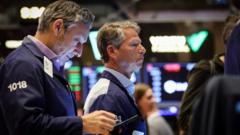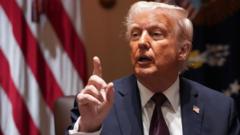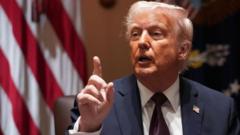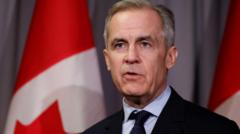The prospect of new tariffs proposed by President Trump is unsettling global markets, with significant declines observed in Asia and Europe. U.S. stocks initially dipped but showed some resilience, while concerns mount about potential trade wars and their economic implications.
Market Reactions and Global Concerns as Trump Tariffs Loom

Market Reactions and Global Concerns as Trump Tariffs Loom
Investors remain cautious amidst President Trump's impending tariffs, prompting mixed reactions in stock markets across the globe.
As President Donald Trump prepares to announce a new slate of import tariffs, global stock markets are reflecting mixed responses amidst heightened investor anxiety. Following his remarks about imposing taxes on "all countries," Asian and European shares have dipped significantly, while U.S. markets made a cautious recovery.
The anticipated tariffs are positioned within a broader context of Trump's economic strategy, which he refers to as America's "Liberation Day.” This proposal builds upon previous tariffs affecting aluminum, steel, and automotive imports, alongside increased levies on goods imported from China. As a result, fears of a trade conflict re-emerging are rekindled, especially given the vague nature of Trump’s statements on the scope of these tariffs.
In recent comments aboard Air Force One, Trump indicated a potential wide-reaching application of these tariffs: “You'd start with all countries,” he stated, firming up concerns over the implications for international trade relations. The impact is being felt across markets, with declines noted in Japan's Nikkei 225 and South Korea's Kospi, while European indices, including the UK's FTSE 100 and Germany's Dax, also suffered losses.
The uncertainty surrounding the upcoming tariffs has catalyzed significant volatility. For instance, the S&P 500 index recorded almost a 10% drop since mid-February, marking March as particularly challenging for investors. Although U.S. shares opened weakly, they managed to recover slightly, with the Dow Jones Industrial Average finishing up 1%.
Gold prices, often seen as a safe haven during periods of economic instability, rose to new heights, indicating investor wariness. Experts, such as Shanti Kelemen of M&G Wealth, suggest that unpredictable tariff policies will keep the economic backdrop fraught with uncertainty. This sentiment is echoed in industries reliant on exports, like Japan, where major sectors, particularly automobiles and semiconductors, face potential impacts from the tariffs.
While Trump views the tariffs as a mechanism to leverage better trade agreements, create jobs, and safeguard domestic markets, economic analysts caution that increased import costs may lead to inflated prices for consumers. Moreover, businesses like Brompton Bicycle, potentially affected by these tariffs, express concern about the competitive viability of their products in the U.S. market.
As the situation unfolds, various countries, including the U.K., Canada, and the European Union, are preparing countermeasures in response to potential U.S. tariffs, underscoring the global nature of the trade dynamics at play. Trump’s additional announcement surrounding the sale of TikTok’s parent company adds another layer of complexity, scheduled to reach a resolution by April 5, as the administration looks to navigate national security concerns intertwined with economic policies.
In essence, the impending tariffs and their implications have stirred a cocktail of cautious optimism and jitters across global markets, with stakeholders keenly awaiting the coming announcements to gauge the broader economic fallout.























